英语修辞ppt
合集下载
2020高考英语作文专题修辞格 拈连技巧课件(共8张)
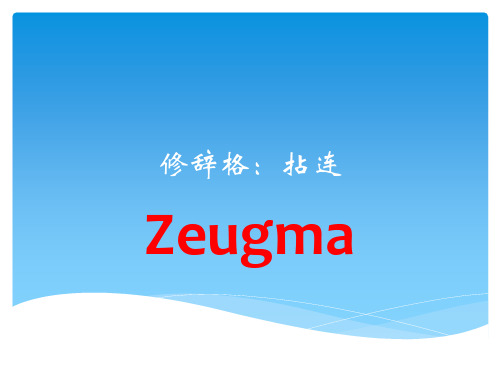
得到金黄的评价;她太渺小,不可对其大加赞扬。
6. I wish my horse had the speed of your tongue. 多么希望我的马儿会跑过你的舌头!
7. She managed to catch the early bus and a bad cold. 她赶上了早班车,也赶上了重感冒。
Defination
拈连(zeugma):
是指甲乙两个事物连在一起叙述时,把本来 只适用于甲事物的词语拈来用到乙事物上,这种 修辞手法就叫拈连,又叫“顺拈”。运用拈连, 可以一语双叙,轭式搭配,使上下文联系紧密自 然,表达生动深刻。例如:
He lost his money and his hope for a better life. 他丢了钱,也丢了过好日子的希望。
Practice: Put the following into Chinese
1. She stood there with weeping eyes and heart. 她站在那儿,眼睛流着泪,心流着血。
2. In fact, I was the efficiency expert for the whole family. I used to organize my father’s tools, my mother’s kitchen, my sister’s boyfriends.
小时孩子们吸干妈妈的奶水,大时榨干爸 爸的薪水。
5. She’s too low for a high praise, to brown for a fair praise, and too little for a great praise.
(W. Shakespeare: Much Ado About Nothing) 她太下贱,不值得褒奖太高;她皮肤太深,不宜
6. I wish my horse had the speed of your tongue. 多么希望我的马儿会跑过你的舌头!
7. She managed to catch the early bus and a bad cold. 她赶上了早班车,也赶上了重感冒。
Defination
拈连(zeugma):
是指甲乙两个事物连在一起叙述时,把本来 只适用于甲事物的词语拈来用到乙事物上,这种 修辞手法就叫拈连,又叫“顺拈”。运用拈连, 可以一语双叙,轭式搭配,使上下文联系紧密自 然,表达生动深刻。例如:
He lost his money and his hope for a better life. 他丢了钱,也丢了过好日子的希望。
Practice: Put the following into Chinese
1. She stood there with weeping eyes and heart. 她站在那儿,眼睛流着泪,心流着血。
2. In fact, I was the efficiency expert for the whole family. I used to organize my father’s tools, my mother’s kitchen, my sister’s boyfriends.
小时孩子们吸干妈妈的奶水,大时榨干爸 爸的薪水。
5. She’s too low for a high praise, to brown for a fair praise, and too little for a great praise.
(W. Shakespeare: Much Ado About Nothing) 她太下贱,不值得褒奖太高;她皮肤太深,不宜
高级句式升级(修辞手法)高考英语书面表达升级高级句式课件

3. 别这么幼稚好不好。(通过be动词联系)
幼稚:
being such a baby Stop being such a baby.
4. 生活就像一条未被涉足的河流,有各种曲折。 (通过be动词联系)
未被涉足的: unexplored 曲折: twists and turns
Life is an unexplored river. full of twists and turns.
刀子:
a knife
捅了一刀: stabbed by
He felt as if his heart had been stabbed by a knife.
PART TWO
metaphor
通过be动词联系
1. 她的头发像是一条流淌在她肩上的金色河流。 (通过be动词联系)
流淌在: streaming down 金色河流: a flowing golden river
寒风: The icy wind 刺痛了我的脸: stinging my face
The icy wind started howling, stinging my face.
6. 夜空中星星向我眨眼睛。(自然现象)
眨眼睛: winked at me 夜空中: in a darkening sky
3. I reached out to touch her face, which was as cold as the ice. (人 物描写) 我伸手去摸她的脸,发现她的脸像冰一样冰冷。
更多搭配: as busy as a bee 忙忙碌碌 as hungry as a wolf 饥肠辘辘 as proud as a peacock 傲如孔雀 as brave as a lion 勇猛如狮 as pretty as a picture 美如画
最新love-is-a-fallacy(英语修辞与写作-lecture-6-1)教学讲义PPT课件
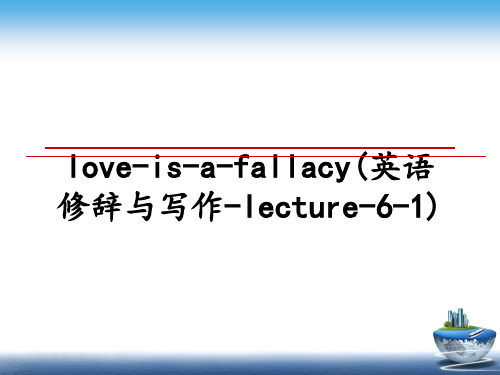
About the story
The narrator of the story is Dobie Gills, a freshman in a law school who is proud of his logic reasoning and general intellectual capability. Dobie Gills grapples with Petey Bellows, whose girlfriend he hopes that he can persuade to give up and Polly Espy, Petey’s girlfriend he intends to marry after he has improves her. He is quite sure of his final success because he is smarter and it is only logical that the girl will choose him. However, the result is a great surprise to him because the girl turns down his proposal and choose Petey Burch, all because of what Dobie Gills regards as a “silly reason”, thus proving that “Love is a fallacy”.
9. You say I shouldn’t drink, but you haven’t been sober for more than a year.
love-is-a-fallacy(英语 修辞与写作-lecture-6-1)
《英语修辞学》第二章

• Development: The development of English ethics can be traced back to any Greece and Rome, where philosophers and orators are such as Aristotle and Cicero established the fundamental principles of ethics Over time, these principles were adapted and adapted by English writers and speakers, resulting in the evolution of a distinct English style of rhetoric that emphasizes clarity, logic, and wit
to the entire cream
Personality and anthropology
要点一
Personalization
Personalization is a rhetorical device where abstract ideas or inanimate objects are given human qualities or attributes For example, "the waves dance in the moonlight" personalizes the waves by giving them the ability to dance
Importance
Rhetoric plays a critical role in communication, allowing individuals to express their ideas clearly and persistently It is essential in various fields such as politics, law, education, and business, where the ability to influence and supervise others is key to success
to the entire cream
Personality and anthropology
要点一
Personalization
Personalization is a rhetorical device where abstract ideas or inanimate objects are given human qualities or attributes For example, "the waves dance in the moonlight" personalizes the waves by giving them the ability to dance
Importance
Rhetoric plays a critical role in communication, allowing individuals to express their ideas clearly and persistently It is essential in various fields such as politics, law, education, and business, where the ability to influence and supervise others is key to success
英语主要修辞手法PPT课件

.
18
Metonymy (转喻/借代)
e.g. The pen (words) is mightier than the sword (forces/war). Beware of bottle. (谨防喝醉酒) The red eyes walked into the classroom. He has a good ear for music. 他善于欣 赏音乐。 He has a sharp tongue.他言语尖刻。
.
12
Hyperbole: (夸张)
e.g. He almost died laughing. Hamlet: I love Ophelia: forty thousand brothers could not, with all their quantity of love, make up my sum. His eloquence would split rocks. My legs weigh three tons.
.
3
Simile:(明喻)
It is an expressed likeness, which makes a comparison between two unlike elements having at least one quality or characteristic (特性)in common. To make the comparison, words like as, as...as, as if and like are used to transfer the quality we associate with one to the other.
.
19
Synecdoche (提喻)
《英语修辞格》.ppt

Closed simile — We not only compare that man
with a pig, but also specify the respect in which they are compared:
—– The man is “as fat as a pig”.
不用like, as 等连词,而采取其他对 比形式。
爱情跟咳嗽一样是掩盖不了的. —– A word and stone let go cannot be
recalled. (proverb) 说出的话收不回.
II. Metaphor(隐喻)
Metaphor is a figure of speech in which one thing is described in terms of another. In a metaphor, a comparison is usually implicit; whereas in a simile it is explicit.
—– In foreign policy, flying solo can be risky business.
—– He was such a marvelous teacher that whenever he recognized a spark of genius, you should be sure he would water it.
Open simile — —– The man over there is like a pig. In this sentence, the secondary term
“pig” has many characteristics such as fat, lazy, dirty, greedy and gross. In which respect or respects is that man like a pig? It does not say. So, it is called an open simile (it does not give any definite information).
英语修辞学(Rhetoric) (1)

英语修辞学(Rhetoric)
English Figures of Speech
英语修辞的一般规律与特点 General principles and features of English rhetoric
1. 关系词丰富,介词、连词、关系代词和关系副词 关系词丰富,介词、连词、 等的充分利用,使英语成为一种更为形式的语言, 等的充分利用,使英语成为一种更为形式的语言, 即以形合为主的语言。而汉语是以意合为主的语言。 即以形合为主的语言。而汉语是以意合为主的语言。
4. 英语被动句用得多,汉语主动句用得多。这更说明了英语 英语被动句用得多,汉语主动句用得多。 物称倾向” 的“物称倾向”。 An illustration is furnished by an editorial in the Washington Post (January 17, 1962). 华盛顿邮报》 《华盛顿邮报》(1962年1月17日)的一篇社论提供了一个 年 月 日 例子。 例子。 It has been known for a long time that there is a first relationship between the heart and liver. 长期以来,大家知道心脏和肝脏的关系是最重要的。 长期以来,大家知道心脏和肝脏的关系是最重要的。 The challenge from the Third World has always been foreseen by our shipping companies. 我国的海运公司总能预见来自第三世界的挑战。 我国的海运公司总能预见来自第三世界的挑战。
The three uses of similes:
Descriptive描述型明喻; Illuminative启示型明喻 ; Illustrative说明型明喻;
English Figures of Speech
英语修辞的一般规律与特点 General principles and features of English rhetoric
1. 关系词丰富,介词、连词、关系代词和关系副词 关系词丰富,介词、连词、 等的充分利用,使英语成为一种更为形式的语言, 等的充分利用,使英语成为一种更为形式的语言, 即以形合为主的语言。而汉语是以意合为主的语言。 即以形合为主的语言。而汉语是以意合为主的语言。
4. 英语被动句用得多,汉语主动句用得多。这更说明了英语 英语被动句用得多,汉语主动句用得多。 物称倾向” 的“物称倾向”。 An illustration is furnished by an editorial in the Washington Post (January 17, 1962). 华盛顿邮报》 《华盛顿邮报》(1962年1月17日)的一篇社论提供了一个 年 月 日 例子。 例子。 It has been known for a long time that there is a first relationship between the heart and liver. 长期以来,大家知道心脏和肝脏的关系是最重要的。 长期以来,大家知道心脏和肝脏的关系是最重要的。 The challenge from the Third World has always been foreseen by our shipping companies. 我国的海运公司总能预见来自第三世界的挑战。 我国的海运公司总能预见来自第三世界的挑战。
The three uses of similes:
Descriptive描述型明喻; Illuminative启示型明喻 ; Illustrative说明型明喻;
2020高考英语作文专题修辞格 对偶技巧课件(共20张)

Drill 2
1.If a society cannot help the many who are poor, it cannot save the few who are rich. (John F. Kennedy) 2.Why are some people argumentative and domineering, while others are shy and hesitant? Why are some people greedy, selfish and cynical, while others are kindly and easy to get along with? (Gordon R. Lowe)
Everything that happens in this world happens at the time God chooses. He sets the time for birth and the time for death, the time for planting and the time for pulling up, the time for killing and the time for healing the time for tearing down and the time for building.
书有可浅尝者,有可吞食者,少数则须咀嚼 消化。(王佐良译)
zjxuehb@
参考书目
吕煦 实用英语修辞 清华大学出版社 2004年1月第1版 徐鹏 修辞与语用 上海外语教育出版社 2007年6月第1版 冯翠华 英语修辞大全 外语教学与研究出版社 2005年1月第1版 吴平 英汉修辞手段比较 安徽教育出版社 2001年9月第1版
高级英语第二册修辞汇总PPT课件

within the circle of adults. Grandmother
Koshak 乞im求plored, "Children, let's sing!"
17. A second wall moved, wavered, Charlie
Hill tried to support it, but it toppled on him,
8. Richelieu Apartments were smashed apart
as if by a gigantic fist, and 26 people perished.(Para. 20)simile、personification
9. …and blown down power lines coiled like black spaghetti over the roads.(Para.28)
conspicuous.(P16)
•
—Synecdoche(提喻)
6、 As the storks flew northward the Negroes were marching southward—a long,dusty column,infantry,screw-gun batteries,adnthen more infantry,four or five thousand men in all,winding up the road with a clumping of boots and a clatter of iron wheels.(P18)
6. “We can batten down and ride it out,”
he said. 封舱
安然度过
英语修辞手法及练习ppt课件
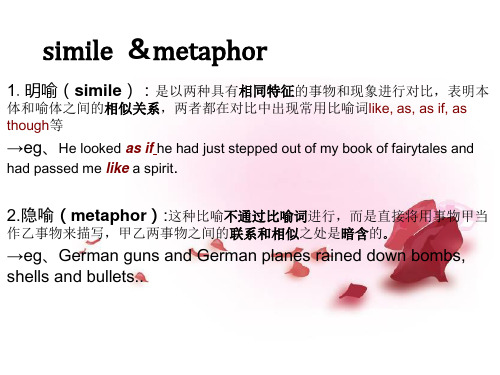
→eg.My only worry was that January would find me hunting for a job
again.
病原体侵入机体,消弱机体防御机能 ,破坏 机体内 环境的 相对稳 定性, 且在一 定部位 生长繁 殖,引 起不同 程度的 病理生 理过程
Pun & Parody & Oxymoron
ironysy & nesthesia &personification
• 7.讽刺(irony):用含蓄的褒义词语来表示其反面的意义,从而达
到使本义更加幽默,更加讽刺的效果。
→eg .It would be a fine thing indeed not knowing what time it was in
→eg.Iam sorry, I am so sorry, I am so extremely sorry.
• 15、拟声(onomatopoeia)是摹仿自然界中非语言的声音,其发音和所描写
的事物的声音很相似,使语言显得生动,富有表现力。
→eg .She banged the door after her.
• 10.双关语(pun)是以一个词或词组,用巧妙的办法同时把互不关
联的两种含义结合起来,以取得一种诙谐有趣的效果。
→eg .Napoleon was astonished.”Either you are mad, or I am,”he
declared. “Both,sir!”cried the Swede proudly.
.
病原体侵入机体,消弱机体防御机能 ,破坏 机体内 环境的 相对稳 定性, 且在一 定部位 生长繁 殖,引 起不同 程度的 病理生 理过程
• 6.She may have tens of thousand of babies in one summer.(from“ Watching Ants”)。(persnification)
again.
病原体侵入机体,消弱机体防御机能 ,破坏 机体内 环境的 相对稳 定性, 且在一 定部位 生长繁 殖,引 起不同 程度的 病理生 理过程
Pun & Parody & Oxymoron
ironysy & nesthesia &personification
• 7.讽刺(irony):用含蓄的褒义词语来表示其反面的意义,从而达
到使本义更加幽默,更加讽刺的效果。
→eg .It would be a fine thing indeed not knowing what time it was in
→eg.Iam sorry, I am so sorry, I am so extremely sorry.
• 15、拟声(onomatopoeia)是摹仿自然界中非语言的声音,其发音和所描写
的事物的声音很相似,使语言显得生动,富有表现力。
→eg .She banged the door after her.
• 10.双关语(pun)是以一个词或词组,用巧妙的办法同时把互不关
联的两种含义结合起来,以取得一种诙谐有趣的效果。
→eg .Napoleon was astonished.”Either you are mad, or I am,”he
declared. “Both,sir!”cried the Swede proudly.
.
病原体侵入机体,消弱机体防御机能 ,破坏 机体内 环境的 相对稳 定性, 且在一 定部位 生长繁 殖,引 起不同 程度的 病理生 理过程
• 6.She may have tens of thousand of babies in one summer.(from“ Watching Ants”)。(persnification)
英语修辞格译法ppt课件

United we stand, divided we fall. 合则存,分则亡。
20
(三)句式修辞格(syntactical rhetorical devices)
句子结构上的修辞格主要是指通过句子结构的 布局或变化来达到一定的修辞手法。这类辞格 主要包括 repetition反复, rhetorical question设问, antithesis对偶, apostrophe倒装,parallelism排比, climax层递 等。例如:
(转喻),transferred epithet(转移修饰),
personification(拟人), hyperbole(夸张),
irony(反语), euphemism(委婉语), pun(双
关), oxymoron(矛盾修辞法), zeugma(轭式
搭配法), contrast (对照)等。
8
(1)The baby was brought up on the bottle.
这个婴儿是喝牛奶或羊奶长大的。(metonymy── 用奶瓶代奶)
(2)Some mute inglorious Milton here may rest.
某个沉默的、无名诗人也许在此长眠。
(antonomasia──用米尔顿代诗人)
6
Assonance是在一句话或在一个诗行中间,有两 个或更多的词具有相同的元音。例如:
With this faith we will be able to hew out of the mountain of despair a stone of hope. 怀着这个信念,我们能把绝望的大山凿成希望 的磐石。
sweet sorrow 忧喜参半 (不是甜蜜的悲伤); proud humility 不卑不亢 (不是骄傲的谦卑)
20
(三)句式修辞格(syntactical rhetorical devices)
句子结构上的修辞格主要是指通过句子结构的 布局或变化来达到一定的修辞手法。这类辞格 主要包括 repetition反复, rhetorical question设问, antithesis对偶, apostrophe倒装,parallelism排比, climax层递 等。例如:
(转喻),transferred epithet(转移修饰),
personification(拟人), hyperbole(夸张),
irony(反语), euphemism(委婉语), pun(双
关), oxymoron(矛盾修辞法), zeugma(轭式
搭配法), contrast (对照)等。
8
(1)The baby was brought up on the bottle.
这个婴儿是喝牛奶或羊奶长大的。(metonymy── 用奶瓶代奶)
(2)Some mute inglorious Milton here may rest.
某个沉默的、无名诗人也许在此长眠。
(antonomasia──用米尔顿代诗人)
6
Assonance是在一句话或在一个诗行中间,有两 个或更多的词具有相同的元音。例如:
With this faith we will be able to hew out of the mountain of despair a stone of hope. 怀着这个信念,我们能把绝望的大山凿成希望 的磐石。
sweet sorrow 忧喜参半 (不是甜蜜的悲伤); proud humility 不卑不亢 (不是骄傲的谦卑)
英语修辞轭式搭配的用法PPT课件

第16页/共24页
• (5)He was on his feet, flinging his arms, his rhetoric and his control to the winds, alternately abusing Ernest for his youth and demagoguer y, and savagely attacking the working class, elaborating its inefficiency and worthlessness.
第4页/共24页
一笔双叙和轭式搭配的区别
•在 用 一 个 词 ( 如 动 词 、 介 词 、 形 容 词 ) 去 修 饰 支 配 另 外 两 个 或 多 个 临 近 词 时 的 情 况 下 : •syllepsis :该词(v.prep.adj. )与邻近词能够成正常的搭配关系。 •如:He lost his hat and his temper.
第3页/共24页
Zeugma特征
• 从以上注释可得出Zeugma的两点特征: • 其一是“共轭性”,即通常用一个形容词或动词(有
时是介词)修饰或支配两个或两个以上的名词; • 其二是“两种(或两种以上)搭配意义表面上的”
不协调性”,即一种常见搭配和一种非常搭配的结 合,给读者的第一印象造成不协调的感受,这种不协 调感受在读者回神时瞬间即逝,进而因强烈地感受 到话语者的深刻用意而释然,正是这种“不协调 性”,Zeugma的应用方能在交际目的中发人深省,
•例(14)中get out of humor和put on the water 都是“牵强符合”的搭配,分别与正常的搭配连用, 使语言显得幽默风趣。
第22页/共24页
修辞手法拈连(niān lián),是指甲乙两个事物连在一起叙述 时,把本来只适用于甲事物的词语拈来用到乙事物上,这种修辞 手法就叫拈连,又叫“顺拈”。运用拈连,可以使上下文联系紧 密自然,表达生动深刻。 例子(1):蜜蜂是在酿蜜,又是在酿造生活。
• (5)He was on his feet, flinging his arms, his rhetoric and his control to the winds, alternately abusing Ernest for his youth and demagoguer y, and savagely attacking the working class, elaborating its inefficiency and worthlessness.
第4页/共24页
一笔双叙和轭式搭配的区别
•在 用 一 个 词 ( 如 动 词 、 介 词 、 形 容 词 ) 去 修 饰 支 配 另 外 两 个 或 多 个 临 近 词 时 的 情 况 下 : •syllepsis :该词(v.prep.adj. )与邻近词能够成正常的搭配关系。 •如:He lost his hat and his temper.
第3页/共24页
Zeugma特征
• 从以上注释可得出Zeugma的两点特征: • 其一是“共轭性”,即通常用一个形容词或动词(有
时是介词)修饰或支配两个或两个以上的名词; • 其二是“两种(或两种以上)搭配意义表面上的”
不协调性”,即一种常见搭配和一种非常搭配的结 合,给读者的第一印象造成不协调的感受,这种不协 调感受在读者回神时瞬间即逝,进而因强烈地感受 到话语者的深刻用意而释然,正是这种“不协调 性”,Zeugma的应用方能在交际目的中发人深省,
•例(14)中get out of humor和put on the water 都是“牵强符合”的搭配,分别与正常的搭配连用, 使语言显得幽默风趣。
第22页/共24页
修辞手法拈连(niān lián),是指甲乙两个事物连在一起叙述 时,把本来只适用于甲事物的词语拈来用到乙事物上,这种修辞 手法就叫拈连,又叫“顺拈”。运用拈连,可以使上下文联系紧 密自然,表达生动深刻。 例子(1):蜜蜂是在酿蜜,又是在酿造生活。
英语修辞学(Rhetoric).ppt

4. 英语被动句用得多,汉语主动句用得多。这更说明了英语 的“物称倾向”。 An illustration is furnished by an editorial in the Washington Post (January 17, 1962). 《华盛顿邮报》(1962年1月17日)的一篇社论提供了一个 例子。 It has been known for a long time that there is a first relationship between the heart and liver. 长期以来,大家知道心脏和肝脏的关系是最重要的。 The challenge from the Third World has always been foreseen by our shipping companies. 我国的海运公司总能预见来自第三世界的挑战。
Illustrative说明型
Illuminative启发型
E.g.
What happened to a dream deferred 延期的 (postponed)? Like a raisin (葡萄干) in the sun? Or fester (化脓) like a sore? Does it stink like a rotten meat?
英语修辞学(Rhetoric)
English Figures of Speech
英语修辞的一般规律与特点 General principles and features of English rhetoric
1. 关系词丰富,介词、连词、关系代词和关系副词 等的充分利用,使英语成为一种更为形式的语言, 即以形合为主的语言。而汉语是以意合为主的语言。
英语修辞学第九章ppt课件
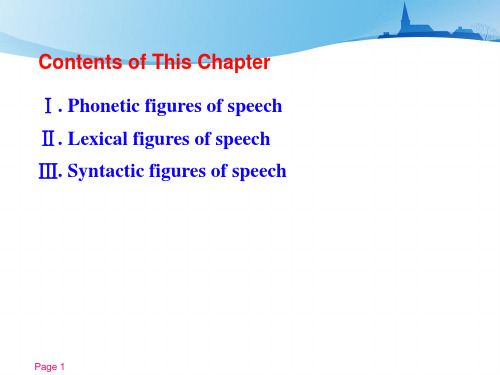
Ⅲ Syntactic Figures of Speech
1. 松散句 (loose sentence) 2. 圆周句(periodic sentence) 3. 对偶句(antithesis)
Extremism in the defense of liberty is no vice; moderation in the pursuit of justice is no virtue. 4. 排比句(parallelism)
16. 换称(antonomasia) (来源:宗教,古代及当代的历史和文学,借代中的专 有名词则无须具有类似的起源)
Solomon tor;
Uncle Tom
17. 通感(synaesthesia)
And like music on the waters
Page 10
采用PP管及配件:根据给水设计图配 置好PP管及配 件,用 管件在 管材垂 直角切 断管材 ,边剪 边旋转 ,以保 证切口 面的圆 度,保 持熔接 部位干 净无污 物
5. 反复( rhetorical repetition) Happy, happy pair None but the brave, None but the brave, None but the brave deserves the fair. (连续反复) Like draws like. (首尾反复) We eat to live, not live to eat.(逆转反复) For glances beget ogles, ogles sighs, sighs wishes, wishes
22. 轭式搭配(zeugma) He ate a bun and a glass of milk. At noon Mrs. Turpin would get out of bed and humor, put
1. 松散句 (loose sentence) 2. 圆周句(periodic sentence) 3. 对偶句(antithesis)
Extremism in the defense of liberty is no vice; moderation in the pursuit of justice is no virtue. 4. 排比句(parallelism)
16. 换称(antonomasia) (来源:宗教,古代及当代的历史和文学,借代中的专 有名词则无须具有类似的起源)
Solomon tor;
Uncle Tom
17. 通感(synaesthesia)
And like music on the waters
Page 10
采用PP管及配件:根据给水设计图配 置好PP管及配 件,用 管件在 管材垂 直角切 断管材 ,边剪 边旋转 ,以保 证切口 面的圆 度,保 持熔接 部位干 净无污 物
5. 反复( rhetorical repetition) Happy, happy pair None but the brave, None but the brave, None but the brave deserves the fair. (连续反复) Like draws like. (首尾反复) We eat to live, not live to eat.(逆转反复) For glances beget ogles, ogles sighs, sighs wishes, wishes
22. 轭式搭配(zeugma) He ate a bun and a glass of milk. At noon Mrs. Turpin would get out of bed and humor, put
高考英语读后续写之修辞手法(共24张PPT)

找出下面句子里面的修辞1. My very thought was like the ghostly rustle of dead leaves. 2.He looked as if he had just stepped out of my book of fairy tales.3. Wind and rain now whipped the house.参考答案:1. 明喻 2.明喻 3. 暗喻
明喻
暗喻
拟人
夸张
Simile: It is a figure of speech which makes a comparison between two unlike elements having at least one quality or characteristic in common. 明喻是比喻修辞的一种,在强调两种事物的相似点的同时,本体、喻体、喻词都出现,且能使语言生动形象。喻词有like, as , as...as, as if, of, compared to, be similar to, what等。 The crocodile looks like a dog. 本体 喻词 喻体
Metaphor: It is a figure of speech containing an implied comparison, in which a word or phrase ordinarily and primarily used of one thing is applied to another. Unlike simile, a word or a phrase that compares one thing to another, using the words like or as. 暗喻是比喻修辞的一种,用一种事物比喻另一种事物,本体喻体都出现,中间常用喻词“是”等连接,有时不用喻词。暗喻的典型形式为:甲是乙,而不用like, as等喻词。 The old man's face is a map of time. 老人的脸是岁月的写照。
英语诗歌修辞手法简介Figures_of_speech PPT
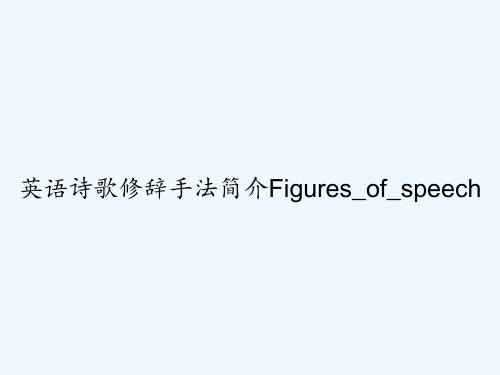
2) That produced by the use of verbs. the kettle sings; the waves danced
3) That produced by the use of nouns. the smiles of spring; the whisper of leaves
the chief functions of figures of speech
to embellish, to emphasize or to clarify.
to give tone or atmosphere to discourse, to provide vivid examples to stimulate thought to give life to inanimate objects, to amuse, or to ornament.
shouldn’t behave like that. Belinda smiled, and all the world was gay.
( A Pope) Her beauty made the bright world dim.
(Shelly ) I have a sea of trouble.
It is closely related to metaphor and is sometimes called personal metaphor .
There are three chief kinds of personifications:
1) That produced by the use of adjectives. the blushing rose; the thirsty ground
Words are either literal or figurative
3) That produced by the use of nouns. the smiles of spring; the whisper of leaves
the chief functions of figures of speech
to embellish, to emphasize or to clarify.
to give tone or atmosphere to discourse, to provide vivid examples to stimulate thought to give life to inanimate objects, to amuse, or to ornament.
shouldn’t behave like that. Belinda smiled, and all the world was gay.
( A Pope) Her beauty made the bright world dim.
(Shelly ) I have a sea of trouble.
It is closely related to metaphor and is sometimes called personal metaphor .
There are three chief kinds of personifications:
1) That produced by the use of adjectives. the blushing rose; the thirsty ground
Words are either literal or figurative
- 1、下载文档前请自行甄别文档内容的完整性,平台不提供额外的编辑、内容补充、找答案等附加服务。
- 2、"仅部分预览"的文档,不可在线预览部分如存在完整性等问题,可反馈申请退款(可完整预览的文档不适用该条件!)。
- 3、如文档侵犯您的权益,请联系客服反馈,我们会尽快为您处理(人工客服工作时间:9:00-18:30)。
4. 以抽象代具体
• All the wit and learning of the world were assembled there. The wise and learned scholars 所有聪明博学的人都聚 集在那里。 • “聪颖”和“学问”都是抽象名词,在此指代“ 学者”。 • It was sickness and poverty together that she came to visit. • Patients poor people 他来探望的是病人和穷人 。 • “疾病”和“贫穷”都是抽象名词,在此分别用 来指代“病人”和“穷人”
借喻重点不是相似是联想 如:The room sat silent.全屋人安静地坐着。 Lend me your ears, please.请听我说。 The pen is mightier than the sword. 文章胜武力。 Finally she married money. 她最终嫁给了 有钱人。
3.以具体代抽象
• He earned his bread as a teacher. 他以教 书为生。 • Living (“面包”指代抽象名词“生计” ) • The wolf and the pig mingled together in his face.他的脸上带着凶残和贪婪的神色 • Fierceness greediness • 用“狼”指代其“凶残的”本性,用“猪 ”指代其“贪婪的”本性。
暗喻没有引导词,这是明喻和暗喻在形式上的 最大区别。换句话说,有为明喻,没有为暗喻。 如:He has a heart of stone. He has a heart like stone.
Metonymy
A figure of speech in which a thing or concept is called not by its own name but rather by the name of something associated in meaning with that thing or concept.
Group two
1
Irony
2
反语
Innuendo
3
暗讽
Sarcasm
讽刺
Irony (反语)
The use of words that say the opposite of what you really mean , often as a joke and with a tone of voice that shows this.
Sarcasm & Irony & Innuendo
三者在进行讽刺嘲弄时,程度有所不 同,innuendo是用委婉曲折、含蓄暗示 的方法说反话,以减少话语的刺激性 ,避免引起讽刺对象的不快。 E.g.: after three days in Japan, the spinal column becomes extraordinarily flexible.(把习惯鞠躬说成是脊梁骨灵 活,十分幽默有趣)
• Irony基于二者之间,而且irony并非全是讽 刺,有时为了造成活泼的调子和幽默诙谐 情趣。
• What a noble illustration of the tender laws of his favored country!---they let the paupers go to sleep.(他们竟然让穷人去睡 觉这是一个高尚的例证说明他那行善的国 家的法律史多么的仁慈)
Innuendo(暗讽)
Definition: a mild form of irony. hinting in a rather roundabout way at something disparaging or uncomplimentary to the person or subject mentioned.(英语修辞的一种, 是一种温和的反语,用一种比较隐晦 曲折的方式表达对所提及的某事某物 的不一致和不赞赏) E.g.: he must take his readings in a bathroom.
2. Effect
(1) 讽刺挖苦 “could you wait a few days for the money? I haven’t any small change about me.” “oh, you haven’t? well, of course I know that gentlemen like you carry only large notes.” (mark twain: one million pound bank-note) 我过几天再付钱行吗- 我身边没有零钱 啊!是吗? 哦!当然啦!我知道像您这样的绅士身上 是只带大票子的
英语修辞 English Rhetorical Devices
• 主讲人:陈秋霖
Group One
1
Simile 明喻
2
Metaphor 隐喻
3
Metonymy 转喻
4
Synecdoche 提喻
Simile
A word or phrase that compares sth. to sth else , using the words like or as . . (Words like as, as...as, seem, as if , as though, similar to and like are used to transfer the quality we associate with one to the other.)
Group three
1
Antithesis 对照
2
Contrast 对比
3
Parallelism 平行
这段话的最后一句就是反语。实际的意思 是说,像你这样的穷光蛋根本就没有什么大 票子。
(2) 幽默俏皮 有时使用反语其旨并非讽刺挖苦而只是使表达活泼俏皮 例如 “generally speaking” said Miss Murdstone, “I don’t like boys. Hoe d’ ye do boy?” Under these encouraging circumstances, I replied that I was very well and that I hope she was the same, with such an indifferent grace that Miss Murdstone disposed of me in two words, “wants manner!” (Charles Dickens: David Copperfield)
2. The whole for the part
• Australia beat Canada at cricket. 澳大利亚 队在板球比赛中击败了加拿大队。 • Cotton suits you. (cotton=the closes made by cotton) • The kettle is boiling. (kettle壶 =the water in the kettle) • Two beers, please. (beers =two glasses of beer)
局部代整体;抽象代详细;原材料代成品 等……
Synecdoche(提喻)
Definition: It involves the substitution
of the part for the whole, or the whole for the part. 提喻是指用部分代表整体,或用整体代表部 分的修辞方法。
比喻中,“喻体”一定要出现,否则比喻不能成 立,“本体”和“喻词”不一定出现。 本体 喻词 喻体
subject indicator of resemblance reference
Simile
√
像 似 犹如 仿佛
√
Metaphor √ 判断词或“成为”类肯定动词 √ Metonymy 乙代甲
Synecdoche 不出现 不出现 √ √
1. the part for the whole
• The poor man has six mouths to feed in his family. (mouths=people) 这可怜的人要养六口人 。 • The farms were short of hands during the harvest season. ( hands =labors)在收获季 节里农场缺乏劳动力。 • He can’t ride a wheel. 他不会骑自行车。 (Bicycle: “轮子”只是自行车的一个部件 ,在此用来指代“自行车”。)
如:Jim looks like his brother Billy. My car runs as fast as the train.
Metaphor
A word or phrase used to describe sb. or sth. else , in a way that is different from its use , in order to show that the two things have the same qualities and to make the description more powerful.
• Sarcasm则直截了当,单刀直入,是辛 辣的讽刺,尖刻的挖苦,故意伤害讽 刺对象。 • E.g.: laws are like cobwebs, which may catch small files, but let wasps break through.(法律像蜘蛛网一样,能捉住 小苍蝇,却让胡风,黄蜂钻进去。把 法律比喻成蜘蛛网来讽刺当时法律的 不公正)
